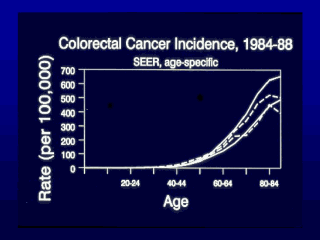 |
Fundamentally, colorectal
cancer, like many cancers, is a disease of aging; as we age we have increased risk. That
has tremendous implications for screening. First, on the one hand, of course, is the
question of when to begin screening. The traditional age is age 50 if you’re of average
risk. But more importantly, the area of the colon that becomes involved with cancer may
change over time. We’re starting to see that in older people we have more proximal
disease, further deep inside the colon. So if that happens, that has implications for
using things like sigmoidoscopy, for example, which only examines the first half of the
colon. |
